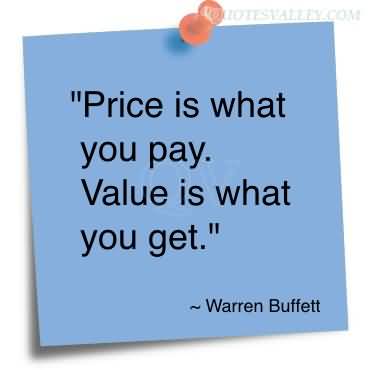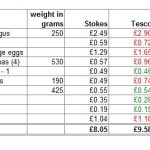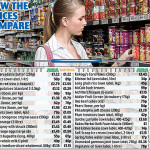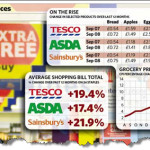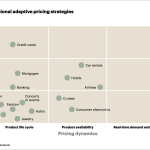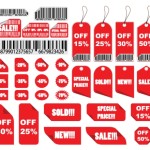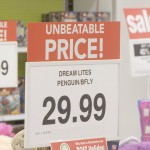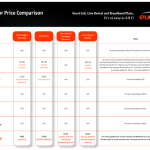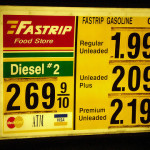As the old saying goes, anything is worth only what someone is prepared to pay for it, though in the case of shops the answer is the most they can lure you in and hook you into buying at the highest prices they can get away with. That’s right, the highest, not the lowest. Competition, in my estimation, is largely an illusion – smoke and mirrors. Yes, sure supermarkets will sell you an industrially produced £3 chicken of dubious provenance and little or no flavour – and doubtless many other prices lower than we paid before, but they are in the profits game, nothing more. Don’t believe what they tell you is a bargain is necessarily good value for money.
I’ve referred on many occasions to the idiotic tricks performed by brand marketeers to con us into paying more while thinking we are paying less for goods. Were I to ask whether they think we are stupid and gullible, the answer must surely be a resounding YES! To the marketing people it’s simply the tools they use based on a study of the psychology of pricing, though in my humble opinion it fools nobody and merely insults our intelligence with dishonest tactics.
The age-old favourite is to charge, say, £6.99 rather than £7, or for that matter £6999 rather than £7000. Psychologically we are said to feel the former is much better value than the latter, though perversely I am more likely to buy at the straight £7 precisely because I feel the retailer is being straight and honest with me, perhaps something the marketing people have yet to twig.
There are plenty of other tricks they employ, many of which are counterproductive since observant shoppers will often be fully aware of the cynical ploys being adopted. One that is just hugely irritating is in TV adverts where they might say “six nine nine” rather than “six hundred and ninety-nine” – as if you were more likely to buy that way.
Then there are the swingeing discounts. “FIFTY PERCENT OFF” scream the posters and adverts. Fifty percent off what? How do we know they haven’t doubled the prices and then offered a 50% discount? Ah, by law they are supposed to have had said item on sale at the full price for a certain number of weeks, and are banned by law from having permanent “sale” – though that seems to stop no retailer. Are they flouting the law and hoping the beleaguered trading standards inspectors fail to check them out, or is it all a con?
Look at supermarket prices with their TV ads and posters claiming “everyday low prices”, “rollback”, “value” etc. Yet everyday prices are on an inexorable rise upwards, whatever they tell you. Funnily enough, the price rises are never emblazoned in their ads, yet there are infinitely more of them. If they are picked up and a senior bod interviewed on the radio, they will be wringing their hands about commodity prices and all manner of things out of their control, yet it is the drive to increase prices and profits that make supermarkets act in this fashion. They are also fond of undercutting their supplier prices, but that is another story.
The tricks of the trade are still not hard to spot. How many times have you noticed a item on a special promotion which turns out to be a price increase with a temporary reduction to the price it was at before, or subject to a BOGOF offer? After a period of time it returns to the newly increased full price and that is the accepted norm. Other items you have bought for a while just get increased quietly and without warning or explanation.
One I spotted a while back concerned the Tesco “Finest” range – which is often a con. In this case there were two decent varieties of French wine, a Crozes-Hermitage and a Gigondas, which had been on sale for some while at something like £5.99 and £7.99 respectively. These were, given the quality of the products, fair prices. Then it all changed and both were given a “Finest” label. Overnight they were retailing at £2-3 higher per bottle for exactly the same wine. Does giving a product a new label make it worth more? Not in my book!
In fact, if you go around the shelves of supermarkets there are very many branded products that are sold at hugely inflated prices, some on almost permanent promotions, and others seeing themselves as “premium” and therefore being sold at much higher prices than essentially the same product in different packaging. Logically we should all shop at the Aldis and Nettos of this world, the true discount shops, but we stick to the known names, the Tesco, Asda, Sainsburys, Morrisons and Waitrose, plus Budgen if you live in the South East. Is it a case of choice or laziness?
Fruit and veg in supermarkets, unless you buy them marked down because the arbitrary dates placed on the labels are set to expire, are often at absurd prices. If you were able to compare directly to market stalls and farm shops you would see the products are not good value at all, but in the name of convenience many people buy their whole shop from one store and thereby get ripped off for a good many products. We simply don’t compare and shop around like we used to, and supermarkets see their role as being to discourage you from doing so with all manner of tactics. More choice? We actually have far less than we used to, and the death of town centres in favour of out-of-town retail parks and supermarket outlets simply adds to that dilution of choice – which in turn fuels price rises in the stores.
Everywhere you go there is evidence of unfair pricing. This week forecourt fuel prices have been cleared, though that was a poor study since the operators of petrol stations are not the guilty parties – the oil companies that do trading and set wholesale pricing are the ones that profiteer by exploiting the consumer due to inelastic demand – we have no choice but to buy and when we need fuel we don’t have the option to shop around – and drive miles – to find better prices. If we notice them locally, all well and good, but at no point can we be sure we are not paying 2p a litre too much.
Worse, the comparison sites set up supposedly to help us with commodities like insurance, energy prices and much more, are often not on a level playing field. Their criteria and means of comparison may be skewed, in fact they may be devised in such a way to favour one or two suppliers who pay them through the nose for the privilege. So who do you trust nowadays?
The saddest thing is that “psychological pricing” has been built up as a pseudo-science, one that aims to persuade the consumer to buy something at a higher price than they intended to pay for it, or maybe even something they never needed in the first place (read here and here.) There are so many scams in this industry that it’s hardly surprising you can’t escape them, but sooner or later the consumer will fight back and demand honesty and fair play, though perhaps the scariest thought of all is that we don’t really care if we are paying the fairest prices, so long as we are comfortable in the process. Is this just a game we unwittingly accept? Are we complicit?
For example, fresh semi-skimmed is a commodity item – all semi-skimmed milk is the same quality. In Tiptree, the Asda store is but a short walk from the Tesco store, yet Asda is charging £1 for 4 pints of semi-skimmed milk, in comparison to £1.29 at Tesco. I therefore buy my milk at Asda, but I see no sign of people stopping their milk purchases in Tesco. I get the impression most people don’t honestly care enough to walk down the road to buy their milk cheaper.

